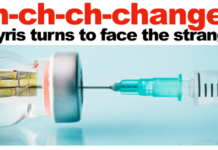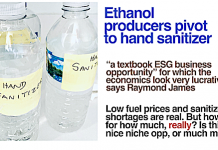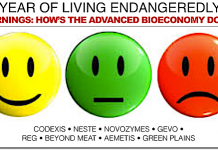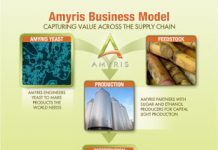Jim Lane
The Coca-Cola Company invests in Gevo, Virent and Avantium partnerships, in the race to develop renewable plastic bottling entirely from renewables.
There’s been an awful lot of press this week about progress in the search for the God particle. That’s the subatomic Higgs Boson a key, but as yet undetected, anchor in the standard model of the universe.
Then there’s the Jesus molecule. As in, “Kind lord Jesus in Heaven, grant me an affordable way to make one of those.”
It’s renewable PX, also known as your friend, paraxylene a key, but as yet undiscovered at affordable cost, anchor in the production of plastic bottles entirely from renewables. (“PX” also accidentally looks not entirely unlike the Chi-Rho, one of the earliest symbols for Jesus Christ.)
That’s the story for Main Street. Here’s the story for Wall Street. It’s the key molecule to unlocking a global market for renewables of 54 million metric tons, and an annual trade of $100 billion.
The search for renewable PX took a new twist yesterday in New York, when the Coca-Cola Company turned on the klieg lights to announce multi-million dollar investment and partnership agreements with Gevo (GEVO), Virent and Avantium. The goal? To accelerate development of the first commercial solutions for its next-generation PlantBottle packaging, using renewable PX.
Since introduced in 2009, the Company has already distributed more than 10 billion first-generation PlantBottle packages in 20 countries worldwide with up to 30 percent renewable content. With this announcement, Coke aims for 100 percent plant-based packaging, at scale, by mid-decade.
The goal with each of these three agreements is to ensure that the companies a) produce the materials that Coke needs, b) produce them in big quantities, and c) as soon as possible, please.
Coke and its 3 renewable PET shops
From left: Virent CEO Lee Edwards, Gevo CEO Pat Gruber, Coke VP Ron Frazier, and Avantium CEO Tom van Aken
What is Coke plastic bottling? It is a material called PET (For you Digest purists: polyethylene terephthalate. Say that three times real fast.) For now, key in on that polyethylene, then that ethylene. It’s a form of polyester that is see-through, and is an excellent barrier material. Not much gets through these little molecules.
Accordingly, it’s become the third most widely-produced polymer in the world, after polyethylene and polypropylene. PET makes up about 20 percent of the world’s polymer production, and about 30 percent of that PET goes into making plastic bottles.
In short, Coke and Pepsi have a big stake in a big game.
Over the past few years, both companies have been working flat-out to produce a plastic bottle made entirely from renewables. Two years ago, Coke came out with its first-gen PlantBottle technology.
Ok, here’s where the story will get a little technical, so grab a snack and a pencil.
To make a partially-renewable PET, Coke is using about 30 percent MEG (that is, mono-ethylene glycol), which it is making from biomass already. The other 70 percent comes from PTA (purified terephthalic acid.
In other words, MEG+PTA = plastic bottle.
To date, they still have been using traditional fossil materials for the PTA. That’s where Coke’s announcement makes waves.
OK, how do you make PTA from renewables?
Well, to make PTA, you have to make something called paraxylene, it’s the principal precursor. In the industry, it’s known as PX. And bottle production chews up about 98 percent of global paraxylene production each year. (Read this, and then forget it: Basically, it’s a benzene ring, with a pair of methyl molecules attached to it.)
What you need to know is that PX is a hydrocarbon.
Why not just use, say, polyethylene?
Good news, Coke does, in Odwalla juice products. Works for juice in the fridge. Does not work for products outside of the fridge, especially carbonated ones.
What about some other molecules?
Well, there’s PEF. That’s a new bio-plastic that Avantium makes, using its YXY chemical catalytic technology. Hence, Coke’s interest in Avantium.
First milestones in that agreement include the start-up of an Avantium PEF pilot plant, officially opened on December 8th in Geleen, the Netherlands. It is expected that other large co-development partners will join from early 2012.
Back to the PX, then. The tip-offs.
OK, turns out that, according to all of the 30 or so companies they looked at, Virent and Gevo had the best available technology (available for co-development, that is) that can make paraxylene.
That’s something that several astute Digest readers picked up at the time of Gevo’s last analyst presentation:
“Production ramp on pace. The retrofit of Gevo’s first commercial plant in Luverne remains on track for a 1H12 start-up. The 500,000 liter/year plant at the South Hampton facility should come online by year-end, initially producing jet fuel, and later, gasoline and paraxylene (for PET applications) to support certification processes. Gevo expects to receive ASTM certification for its jet fuel in 2013. Management affirmed the target of 350 million gallons in 2015, unchanged from the IPO.”
In fact, back in March it has already announced a first paraxylene production deal.
Back in July, Virent tipped its hand as well:
“Virent says that producing PET from waste such as corn stover and pine residuals is more difficult than from sugars but that it can be done. The company makes paraxylene, a PET feedstock, from sugars. Expectations are that its commercial scale facility will be online in late 2014.”
As far back as June, Digest readers had an early tip from Avantium:
“Avantium is building a pilot plant to demonstrate its YXY technology which enables the cost effective production of Furanics building blocks for green materials and fuels. This will facilitate the development and commercialization of Avantium’s next-generation polyester: PEF…Avantium has demonstrated that PEF has numerous superior properties when compared with PET, including lower permeability of oxygen, carbon-dioxide and water and an enhanced ability to withstand heat.”
The business case
Here’s the good news, from our report last June on paraxylene and its opportunities:
“In the case of a Gevo-retrofitted plant, the biorefiner can produce biobutanol plus co-products, or paraxylene and the same co-products – to give one example. Turns out, in renewable fuels as well as elsewhere, it takes two (products) to tango. Pricing moves around in these volatile markets, but as a rule of thumb, paraxylene prices at around a 25 percent premium to ethanol (after taking into account the lower yields of isobutanol, per ton of feedstock). PET sells for roughly a 125 percent premium.”
Botttom line, you can make good money in this market. Things, as it turns out, do go better with Coke.
Wh
at’s a Pepsi to do?
Well, over at Pepsi they haven’t tipped their hand, except that last March they declared that they had a solution in hand of their own to produce renewable PET. This week, they said they were planning a pilot run of up to 200,000 bottles using their new process, but no one is sure when this will reach commercial scale, or even if the Pepsi process will be commercially feasible.
In Coke’s case, it is looking like 2014-15.
Reaction from Gevo
“We are extremely gratified to have won the confidence of The Coca-Cola Company and are excited to support Coca-Cola’s sustainable packaging goals with this agreement to develop and commercialize technology to produce paraxylene from bio-based isobutanol,” said Patrick Gruber, CEO of Gevo. “New technologies need champions. The Coca-Cola Company is in a unique position to drive and influence change in the global packaging supply chain with this development. You cannot ask for a better champion than one of the most respected and admired consumer brands.”
Reaction from Avantium
“Our YXY solution for the packaging industry creates a new biobased plastic with exceptional functional properties at a competitive price. We believe it is economically viable and has a significantly reduced environmental footprint,” said Tom van Aken, CEO of Avantium. “We have produced PEF bottles with promising barrier and thermal properties and look forward to our work with Coca-Cola to further develop and commercialize PEF bottles. Our production process fits with existing supply and manufacturing chains and we are targeting commercial production in the next few years.”
Dutch research and technology company Avantium has developed a patented technology YXY to produce 100% biobased PEF bottles. Currently PET is the most widely used oil-based polyester. Based on the performance of the new PEF material, Avantium believes PEF will become the next-generation biobased polyester.
Reaction from Virent
“The company is targeting early 2015 for the opening of its first full-scale commercial plant. Virent’s long term agreements with The Coca-Cola Company are pioneering milestones in the commercialization of our technology to produce plant-based materials” said Virent CEO Lee Edwards. “Our patented technology features catalytic chemistry to convert plant-based sugars into a full range of products identical to those made from petroleum, including bio-based paraxylene – a key component needed to deliver 100% plant-based PET packaging.”
Reaction from Biofuels Digest
I’d like to buy the world a home
and make it very green
grow apple trees and honeybees
to make my bottles clean
I’d like to teach the world to synth
in perfect laboratories
I’d like to buy PX for Coke
from these three companies.
View Coca’ Cola’s actual “I’d like to teach the world to sing” commercial, in a 1970s holiday incarnation, here.
Jim Lane is editor and publisher of Biofuels Digest where this article was originally published. Biofuels Digest is the most widely read Biofuels daily read by 14,000+ organizations. Subscribe here.









The stockholder’s question is, why is a renewable PX route needed when fossil fuels provide the most cost-effective source? Having said that, the chemistry for renewable PX (eg: wood-to-methanol-to-hydrocarbons) is readily available.
Bill,
IF you’d read the article more carefully, you would have seen that what Jim said was needed was a route to renewable PX “at affordable cost.”